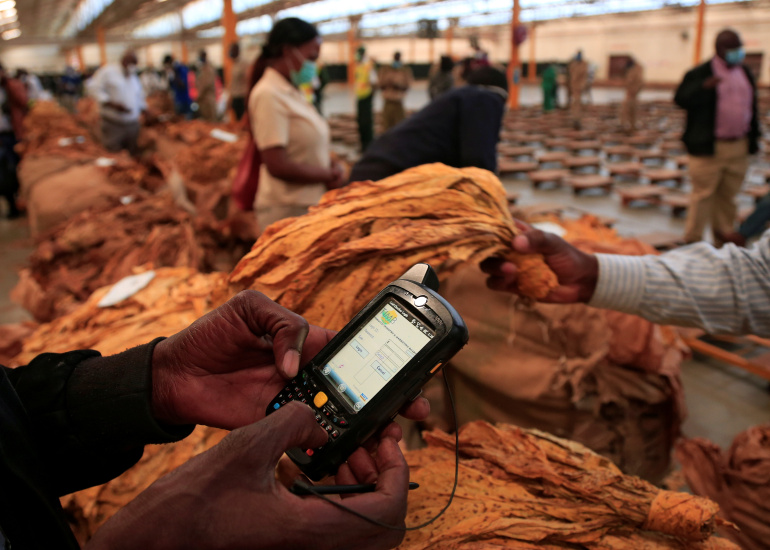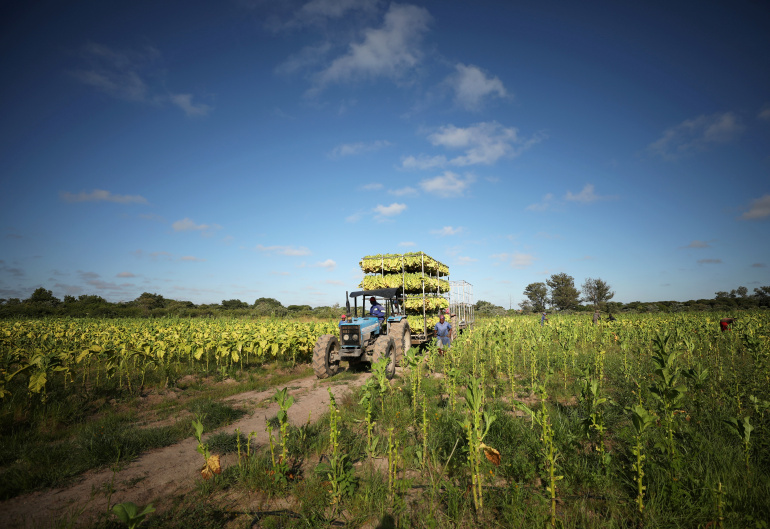Zimbabwe’s tobacco farmers plead for a better deal
Wait times for crop payments and exchange-rate roulette can wreak havoc on tobacco farmers’ profits.
Source: Zimbabwe’s tobacco farmers plead for a better deal | Agriculture News | Al Jazeera

Under the new tobacco-selling regulations put in place since the coronavirus pandemic struck, Zimbabwe’s farmers receive 60 percent of their tobacco payments in United States dollars and the balance in Zimdollars, Zimbabwe’s local currency [File: Philimon Bulawayo/Reuters]
Tobacco is a bright spot in Zimbabwe’s agricultural sector, but wait times for crop payments and exchange-rate roulette can wreak havoc on farmers’ profits.
It’s mid-morning on a Monday. Batwero told Al Jazeera he was still waiting to receive payment for a consignment of tobacco he had sold on Friday, when he arrived from Centenary, a rural area in Mashonaland province, some 144km (89 miles) northwest of Harare.
“I am waiting for my payment later today,” said the 37-year-old tobacco farmer. “I don’t know how much they are going to pay me.”
Tobacco Sales Floor, a division of a Zimbabwe Stock Exchange-listed agro-industrial group, Tobacco Sales Limited, is one of the major auction houses in the country.
After COVID-19 swept the nation last year, the Tobacco Sales Floor – like other auction floors – instituted a new marketing system that doesn’t require farmers to be physically present when they sell their crops. Instead, one person represents a group of farmers at auction, in order to limit physical contact, to make sure they get a good deal.
That’s because under the new tobacco-selling regulations put in place since the coronavirus pandemic struck, farmers receive 60 percent of their tobacco payments in United States dollars – cash in hand they collect at the auction floor. The other 40 percent is paid out in Zimdollars, Zimbabwe’s local currency, which is wired into their bank accounts.

When time is literally money
On the surface, 60 percent payment in foreign exchange is an improvement over last year, when tobacco farmers received only 50 percent of their payment in US dollars.
The current discontent is rooted in the 40 percent balance that’s paid in Zimdollars and the longer waiting periods for actually receiving it.
When tobacco farmers sell their crops, the Zimdollar payment is calculated at the official exchange rate, which continues to trail the black market rate. On a recent Monday, for example, the official exchange rate was 85 Zimdollars to $1. The black market rate was a far less generous 130 Zimdollars to $1.
What’s more, that gap can widen suddenly from day to day, meaning the longer farmers have to wait for Zimdollar payments, the greater the risk that the black market rate turns against them, essentially eroding their real profits.
The upshot: that wait time can literally cost them money, leaving many tobacco farmers deeply disgruntled by the current arrangement.
Persuade Mubvumbi is a 33-year-old tobacco farmer from Bindura, roughly 66km (41 miles) north of Harare. He says he doesn’t agree with the new payment regime because all the materials he needs to farm – from seeds and fertiliser to equipment – are priced in US dollars, not Zimdollars.
“I am not happy at all with the new payment system,” Mubvumbi told Al Jazeera outside the Tobacco Sales Floor, where he too was waiting to receive payment for his crops. “When I get US dollars equivalent in RTGS [Real Time Gross Settlement dollars, also known as Zimdollars] at the official rate, it means I am losing value,” he said, punching a conversion into a calculator to show the pitiful conversion. “The exchange rate is really hurting us.”
Mubvumbi said that back in 2009, his tobacco crop earned him $6,000 at auction – enough to buy cows and maize seed to grow crops to feed them, as well as other items.
“We were able to build decent houses and acquire trucks and grow maize. Everything was good,” he said.
That all changed in 2016, when Zimbabwe’s economy was dollarised and the central bank – in an effort to relaunch a local currency – introduced bond notes, a surrogate currency that authorities said had the same value as the US dollar, but that backfired spectacularly by feeding a speculative frenzy that continues to roil the Zimdollar to this day.
Last year, Mubvumi says he accepted a price of $2,000 for his tobacco crops at auction, $1,000 of which he received in hard cash with the balance paid to him in Zimdollars converted at the official exchange rate.
“When I converted the currency [Zimdollars] on the black market into US dollars, I had only $400,” he said, meaning in real terms, his $2,000 agreed price was really worth only $1,400 in real terms.
He fears he’ll get the same deal this year as well.

Pleading for a better deal
In a recent report, the Zimbabwe Tobacco Association, a trade group for farmers, questioned the viability of the current payments regime. The Association argues that tobacco farmers should receive at least 70 percent of their sales payments in US dollars, given that some 70 percent of the upfront, input costs they face are in US dollars. They also contend that the 40 percent Zimdollar payment further compounds the financial pain they’re enduring.
“We plead with the authorities to review the foreign currency retention level before the start of the selling season,” said the association. “Improving growers’ viability is paramount in ensuring the targeted growth in the sector is achieved and the country realises improved foreign currency inflows.”
Tobacco is a bright spot in Zimbabwe’s long-beleaguered agricultural sector, with sales expected to increase by 8.7 percent this year to 200 million kilogrammes thanks to the best rains in three years, according to official forecasts.
Tobacco exports bring in desperately needed foreign currency – some $782m last year, according to the country’s central bank.
Tafadzwa Muringai, a 36-year-old farmer from Banket, a town 94km (53 miles) northwest of Harare, echoed the sentiments of Batwero and Mubvumbi.
“The farmers who were paid in US dollars when the economy was still dollarised did very well for themselves. They have tractors and cars and hectarage is better,” he told Al Jazeera, adding that he thinks the authorities are leveraging the pandemic to give farmers a worse deal now. “When I go to the market, I am supposed to be satisfied. But I am not.”
